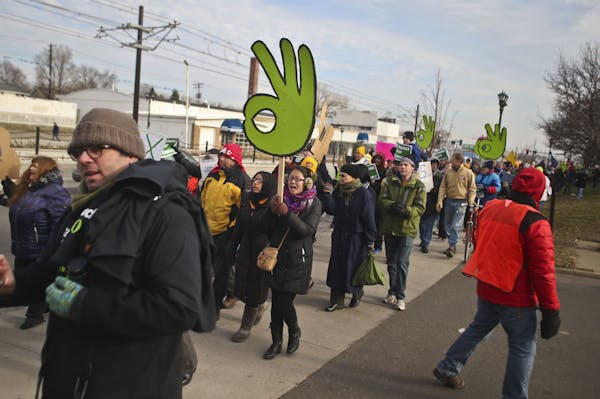Even as shoppers continue to hit stores in droves on Black Friday, retailers are working to extend the shopping bonanza for five days or even longer.
This year's holiday shopping season started in earnest Thursday evening, with Best Buy, Target and many other stores opening well before midnight. Major retailers reported that traffic remained brisk on Friday, and their goal is to keep it that way through the weekend.
"Given how aggressive the promotions were earlier in the month, it's more like a Black November," A.T. Kearney retail analyst Laura Gurski said.
The industry's largest trade group, the International Council of Shopping Centers, now studies a five-day "bargain shopping" period. According to its surveys, about two-thirds of shoppers planned to hit the stores between Thanksgiving and "Cyber Monday," a promotional hook once aimed at workers shopping on their office computers after the holiday weekend.
"One thing is for certain: Consumers are out there in force, and retailers are trying to make the best of it," said Michael Niemira, chief economist with the ICSC.
Target is working a multi-staged strategy for the season, starting with store specials in early November followed by deep discounts on turkeys and home decor in the days before Thanksgiving, said Jeff Jones, the retailer's chief marketing officer. A mobile and online push led into Black Friday, and a "cyber week" starts Monday. In December, the focus shifts to children and deals on toys.
The Minneapolis-based retailer is using its television ads to promote its online site for the first time this year. And with a shopping season that is six days shorter than last year, the ramp-up to the Black Friday weekend remained a key strategy.
"We think about the season in four distinct beats, and in many ways we're just getting started," Jones said. "The real holiday shopping and gift-giving season, we still believe, commences this weekend."
The stakes are high. Retailers ring up 20 to 40 percent of their annual sales during the November-December holiday shopping period. The National Retail Federation expects shoppers to spend $602.1 billion this year during the Christmas season, a 3.9 percent increase from last year.
"A lot of this is an inventory game," Gurski said. "They've got a set of items they'll use on Thanksgiving, they have a different set of doorbusters they use on Black Friday, and then a couple of things to keep you coming in over the weekend. And on Cyber Monday there's a whole new set of doorbusters that you didn't see on Friday."
The Mall of America launched a new social media effort Friday to try to sustain the shopping buzz beyond the busy weekend. Mall employees select random shoppers who are using mobile devices and give away prizes, including $25 gift cards, passes for rides at Nickelodeon Universe or candy treats.
David Jungers, a social media strategist at the mall, said the giveaways can boost the mall's image.
"If … people share that experience online, it can spread fast," he said.
Jungers and his cohorts sit in a basement bunker checking Twitter, Four Square, Facebook and other social media sites as shoppers mention their arrival at the Bloomington mall. After a flurry of digital messages, Jungers makes contact in the flesh.
Nick and Danielle Schmitz scored just after 7 a.m. Friday, after Nick posted an early morning photo of his coffee cup against a backdrop of holiday lights on Twitter.
The couple, who recently moved to Milwaukee from the Twin Cities, gleefully unwrapped the silver box tied up with white lacy ribbon.
"I thought it was pretty cool have an interaction with a person rather than a brand," said Nick, 25, whipping a finger across the screen of his smartphone to call up the conversation with Jungers. "I didn't know what to expect from this 'little surprise' they had for me."
"It'll help with our gift shopping," said Danielle, 24, "or maybe we can buy something for ourselves."
Retailers don't release financial data on Black Friday, though Wal-Mart, Macy's, Target and other major retailers were proclaiming that traffic was steady, even record-breaking.
NPD Group analyst Marshal Cohen observed that with the one-two punch of Thanksgiving sales and midnight openings on Friday, consumers saw a "more civilized shopping experience" than Black Fridays past.
Retailers such as Kohl's, Target and Best Buy each opened with 200 to 300 customers at their doors, but crowds were orderly. Retailers have learned to avoid the crush of shoppers by handing out tickets in advance and distributing the doorbuster items one by one instead of allowing a shopper free-for-all.
Retailers are also limiting many doorbuster purchases to one per customer.
Diana Thor of Roseville said that she was at Herberger's in Rosedale to buy herself a pair of $80 boots for $20.
"I've got more shopping to do, but this is why I came out to shop tonight," she said.
Stan Poffenberger of Minneapolis waited until 10 p.m. to start his shopping at Wal-Mart in Bloomington, but he was still happy with the 10 items he purchased, including a TV, all for himself.
Poffenberger figured that he had saved about $600 on his purchases, but was disappointed to see that his receipt showed a savings of $138.
"I guess was too late for the doorbusters," he said.
Fighting consumers' expectations that they can always get a door-busting deal will be a challenge, analysts say. Even if retailers succeed at extending the shopping energy beyond the weekend, the jury's still out on whether it will translate into higher Christmas sales, Niemira warned.
"Maybe all of these days, including Thanksgiving, is creating a bigger event than just a Black Friday," Niemira said. "But it may not be as good a bellwether for how the overall season does. We've seen that many times — a weak Black Friday and a strong overall holiday season. It's tough to read too much into it."
jackie.crosby@startribune.com • 612-673-7335
john.ewoldt@startribune.com • 612-673-7633
